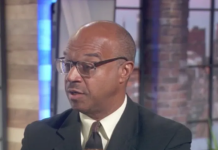The civic engagement group Loud Light and a handful of Wyandotte County and Lawrence residents filed a lawsuit Monday challenging the state’s new congressional districts, contending they help Republicans at the expense of minority voters.
The plaintiffs argue that the Republican map gerrymanders the state in their favor by splitting up Wyandotte and Douglas counties, the state’s two Democratic strongholds with large concentrations of minority voters.
The lawsuit was filed in state court in Wyandotte County, contending that the map violates the state constitution. Former Kansas U.S. Attorney Barry Grissom filed the lawsuit.
A second lawsuit was brought on similar grounds by the American Civil Liberties Union of Kansas and the Campaign Legal Center. It was announced about an hour after the first lawsuit was filed. It was also filed in state court.
Both lawsuits list Secretary of State Scott Schwab and Wyandotte County Election Commissioner Michael Abbott as defendants.
“This case is about politicians choosing their voters by manipulating district lines to secure their preferred electoral outcomes — despite the will of Kansas voters and at the expense of the political power of minority communities,” the Loud Light lawsuit states.
“Partisan gerrymandering, where partisan mapmakers manipulate district boundaries to maximize their own party’s advantage and determine the outcome of elections before anyone casts a ballot, is incompatible with the democratic guarantees enshrined in Kansas’s constitution,” the lawsuit states.
Critics argued that the map dilutes minority voting strength because it moves about 112,000 Wyandotte County residents from the 3rd District into the 2nd District, including about 37,000 Hispanic or Latino residents and about 28,000 Black residents.
The new map stoked controversy because it slices off urban areas of a district now represented by Democratic Congresswoman Sharice Davids and replaces them with more rural areas farther south that lean Republican.
It also takes the liberal college town of Lawrence out of the 2nd District represented by GOP Congressman Jake LaTurner and moves it into the heavily Republican 1st District that extends all the way to the Colorado border.
“It is no surprise that Democrats are trying to sue to make Kansas blue, since they are struggling at the ballot box,” Senate President Ty Masterson said in a statement.
The map “creates compact and contiguous districts with zero deviation, preserves existing district cores, and groups together communities of interest,” he said.
The plaintiffs argue that the Republican caucus’ intention for Kansas’ congressional plan
was known from the start.
It points to comments made by then-Kansas Senate President Susan Wagle in September 2020 to the Wichita Pachyderm Club.
“If Gov. Kelly can veto a Republican bill that gives us four Republican congressmen that takes out Sharice Davids up in the 3rd, we can do that,” she said.
“We can draw four Republican congressional maps, but we can’t do it unless we have a two-thirds majority in the Senate and House,” Wagle said.
The lawsuit seizes on those comments even though she’s been out of office for more than a year and was not involved in drawing the new election boundaries.
“Following a legislative blitz wrought with backroom partisan deals, the Republican supermajorities in the Kansas legislature delivered on Senator Wagle’s promise,” the lawsuit states.
“They overrode Gov. Laura Kelly’s veto and enacted a congressional plan along party lines and over sharp objection from Kansans all over the state, including many of the leading lights of Kansas’s minority communities.
“The enacted plan elevates partisan gain over Kansans’ constitutional rights at the expense of Democrats, racial minorities, and the state’s young voters.”
The lawsuit contends that Republicans created noncompact and oddly shaped districts, which split the two largest Democratic and heavily minority counties in the state: Wyandotte and Douglas.
The lawsuit says Republicans redrew the boundaries “with total disregard for their own redistricting guidelines and traditional redistricting principles.”
The lawsuit even uses Republicans to make its case against the maps.
It points to state Rep. Randy Garber of Sabetha who opposed the plan.
The lawsuit quotes Garber as saying: “I think our party is being bullyish about this and not considering everybody else.”
It also uses comments from Republican state Rep. Steve Huebert of Valley Center as evidence.
“Other Republicans — including one of the chief proponents of the map — openly
admitted the true motives of the Legislature,” the lawsuit states.
And then it used Huebert’s comments against the Republicans.
“Gerrymandering, partisan politics, all those different things that are being discussed and talked about right now, are just things that happen,” the lawsuit quotes Huebert as saying during the floor debate.
“They always have and they always will (draw maps for partisan advantage),” he concluded, referencing the enacted plan.
Republican state Sen. Mark Steffen also figured into the litigation, which cites comments he made speaking against the map while supporting it at the same time.
“Sen. Steffen also openly admitted his motives, noting his concern with the map was based on the partisan makeup of the districts,” the lawsuit states.
“He complained that the map was ‘dumping Lawrence liberals’ into the First District, which he characterized as ‘insidious redistricting [that] will kill off the true conservative character of the Big First,’” the lawsuit said.
The lawsuit also noted that Steffen thought he made a deal for his vote in remarks he made on Kansas City talk radio.
“I [voted for the map] to make some progress on some other fronts,” he told talk show radio host Pete Mundo.
The lawsuit argues that the new maps weaken the voting power of minority voters and Democrats at a time when they are starting to emerge as influential at the ballot box.
As evidence, it points to the election of Sharice Davids, a Native American Democrat, to Congress in the 3rd District and the election of Democratic Gov. Laura Kelly.
“The egregious and systematic dilution of Democratic and minority votes comes on
the heels of both groups’ growing political power,” the suit states.
“Kansas was once known to be a ruby red Republican stronghold,” the lawsuit states.
“As Kansas’s population has grown and changed, the state has shifted closer to the middle of the political spectrum over the last two decades.”
The lawsuit points out that Wyandotte County has been kept whole within a single congressional since 1923.
A three-judge panel of federal judges ended an exception in the 1970s when it found that “splitting the large minority population of Wyandotte County between two districts” was “undesirable,” the lawsuit states.
Further, the congressional maps approved in 2012 also kept Wyandotte and Johnson counties whole in the 3d District, along with the northeastern corner of Miami County.
However, the Legislature was faced with the issue of how to deal with the size of the 3rd District, which grew to a point where it was mathematically impossible to keep the two counties completely intact.
The lawsuit suggest that the new 3rd District should have been formed by slicing off the southern part of Johnson County so that each district would have an equal population.
“The northern sections of Johnson encompass the Democratic and diverse semi-urban and suburban bedroom communities of Kansas City, which have far more in
common with Wyandotte than the remainder of Johnson,” the lawsuit states.
“The southern parts of Johnson County are rural and pair naturally with similar counties to the south.
“It is these sparsely populated rural sections of southern Johnson County, not the northern portions of Wyandotte, which should most logically have been removed from the urban Third District to achieve population equality.”
The Loud Light lawsuit has the support of the National Redistricting Foundation, which is a 501(c)(3) nonprofit affiliate of the National Democratic Redistricting Committee, chaired by former U.S. Attorney General Eric Holder.
The foundation reported raising $7 million during 2018, the last year for which tax records were available.
The committee has a 527 tax-exempt organization, which reported raising about $3.3 million from July 1, 2021, through the end of the year and about $5.8 million for the year.
There’s also a separate political action committee that raised about $1.2 million for the second half of 2021 and $2.6 million for the entire year.
Some of the 527”S biggest donors include the United Food and Commercial Workers International, which gave $200,000 during the second half of last year and $500,000 for the year.
Other big donors included $250,000 from House Speaker Nancy Pelosi and another $250,000 from her leadership PAC. They gave $750,000 for the year.













